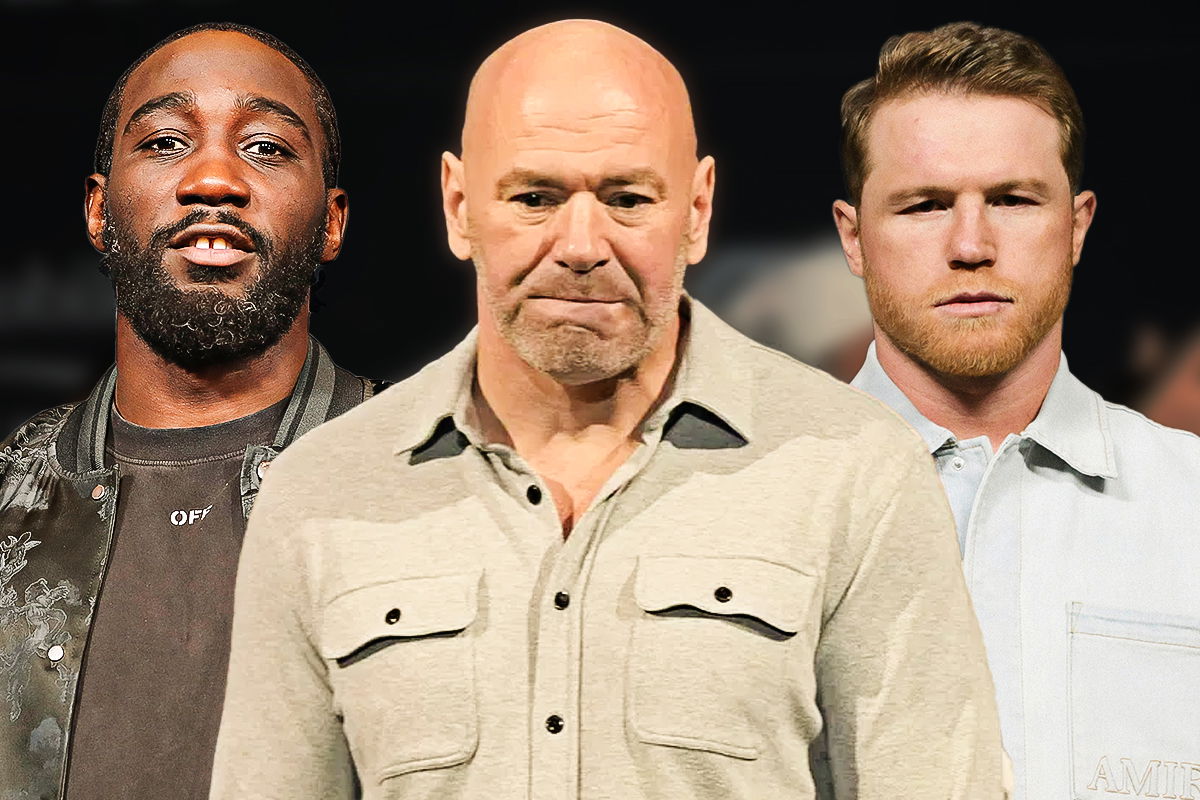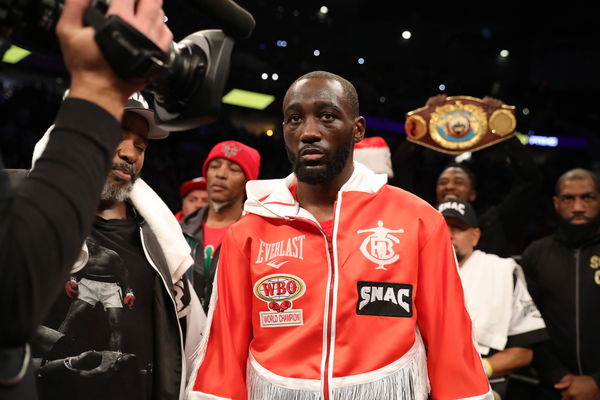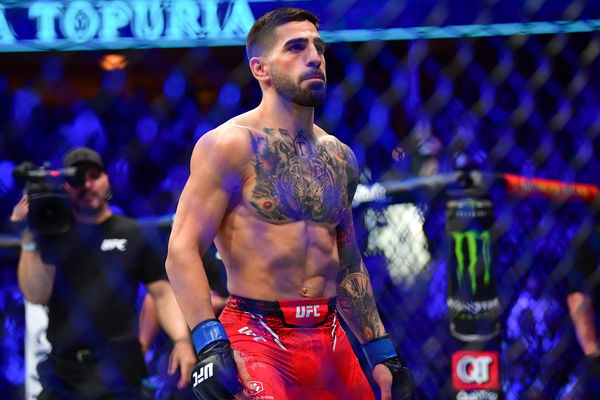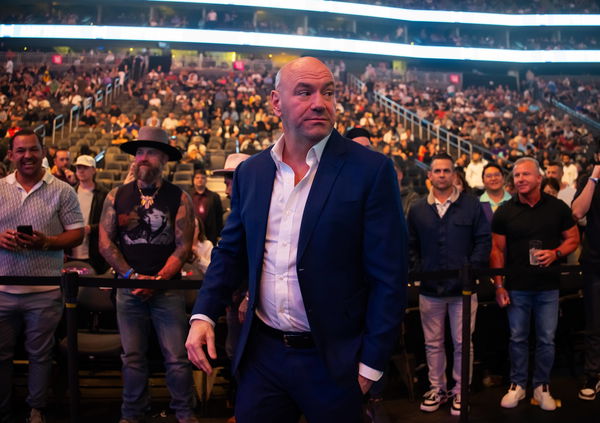
Imago
Credits: IMAGO

Imago
Credits: IMAGO
“The third biggest gate in the history of boxing, and the biggest gate ever in a stadium. It’s awesome and surreal at the same time,” Dana White told KSNV News 3 in Las Vegas recently. The UFC head honcho is clearly hyped about promoting one of the biggest boxing events in history. Canelo Alvarez and Terence Crawford are set to collide on September 13, 2025, in front of a massive crowd at Allegiant Stadium.
Watch What’s Trending Now!
Alvarez and Crawford are perhaps the best boxers in the world right now. So, it’s hardly surprising that they sold out a stadium. But when fans start to make predictions about the fight, one question keeps coming up: Is this fight really fair? So, why are people asking this? The solution may be in the very road that brought these two stars together in the ring.
ADVERTISEMENT
Has Canelo Alvarez only searched for a bigger payday?
Combat sports are, at their core, a business. They’re driven by organizers who want to stage the biggest fights—the kind that capture the public’s imagination and, in return, generate massive profits. Without that, no governing body or promotion company could survive. Simply put, dollars matter. And while the excitement surrounding Canelo Alvarez vs. Terence Crawford as a stylistic and close matchup is still intact, there are also voices labeling this showdown as nothing more than a money fight.
ADVERTISEMENT
Canelo has been one of the top names in boxing for a very long time. A true legend of the sport, he’s the kind of fighter every contender dreams of sharing the ring with—and fans expect nothing less than to see him square off against the best challengers in his division. But sometimes, things don’t line up the way they should. That brings us to the curious case of David Benavidez.
View this post on Instagram
ADVERTISEMENT
Benavidez burst onto the scene as a sensation after defeating Caleb Plant in 2023 to capture the WBC super middleweight interim title. ‘The Red Flag’ was convinced that his dominant performance had earned him a shot at Canelo. Yet, despite repeated callouts—and even after defending his interim belt with a win over Demetrius Andrade later that same year—the fight with Canelo never materialized. Eventually, Benavidez moved up to light heavyweight in 2024. Then, after beating David Morrell in February 2025, he again doubled down on his stance.
According to a Sports Illustrated article, Benavidez stated, “It’s not about the money. It’s about what the sport needs right now.” But that’s not all—Canelo has plenty of surging contenders in the super middleweight division as well. Currently, he holds the WBA, WBC, WBO, IBF, and Ring super middleweight titles. And if we take a look at the rankings, two names stand out! Christian M’billi and Armando Reséndiz are both holding interim championship positions.
ADVERTISEMENT
So, in that sense, Canelo did have contenders lurking around, yet he chose to give the opportunity to Terence Crawford instead. The issue, however, isn’t only about the Mexican champion opting for what many see as a money fight. Crawford himself has taken a different path—one that also left a trail of worthy challengers behind.
Terence Crawford wasn’t about to miss the chance of a lifetime
ADVERTISEMENT
If there’s any superstar in today’s boxing landscape besides Canelo Alvarez, it’s undoubtedly Terence Crawford. With an immaculate 41-0 record—31 wins by knockout and 10 by decision—he has proven himself to be one of the most dangerous fighters in the sport. His last two performances, dismantling Errol Spence Jr. and then outclassing Israil Madrimov, only fueled the belief that he might be the perfect opponent to face the Mexican icon in a true superfight.
However, when Crawford decided to move up two weight classes to chase legacy against Alvarez, eyebrows were raised. Why? According to boxing journalist Dan Rafael, the Nebraska native will be stripped of his status as the reigning 154-pound champion once he steps into the ring with Canelo on September 13. That means Abass Baraou, who’s fresh off an impressive victory over Yoenis Tellez to claim the WBA interim light-middleweight belt, would be elevated to full champion and will defend his belt against Jermell Charlo.
ADVERTISEMENT

Imago
December 10 2022 Omaha Nebraska CHI Health Center Fight Night Action Terence Crawford Bud David Avanesyan Omaha Nebraska USA Copyright: xTomxHoganx CrawfordAvanesyanFightNight_Hoganphotos7379
On top of that, Crawford also vacated his WBO interim super welterweight title, making it clear he won’t be returning to the division. This move officially places him in the super middleweight ranks—not a bad shift, considering he’s chasing the biggest fight of his career. Still, fans had been eager to see him square off against Jaron Ennis, who was declared the IBF mandatory last year. Crawford himself admitted that taking on Ennis didn’t make much sense, as he’s focused on legacy fights that strengthen his path to Hall of Fame status.
Since the Crawford fight, Ennis has moved on. He is now set to make his debut in Uisma Lima on October 11, with the IBO titles on the line. This shows that champions occasionally turn down competitors in order to go for greater, more profitable possibilities. In that way, it seems like the Canelo vs. Crawford fight is more about business than about sports. That makes me wonder: does the same thing happen in the UFC?
ADVERTISEMENT
Does the UFC collapse under similar pressure?
Dana White once called boxing “the most f***ed up business” in an interview with Kevin Iole, and he had plenty of reasons for saying so. But, what frustrates the UFC CEO the most, however, is his belief that boxing promoters hold too much power—and as a result, the best don’t always fight the best. While that can occasionally be the case in the UFC as well, the organization generally sticks to a “best vs. best” philosophy when it comes to matchmaking.
Still, there have been instances where the UFC prioritized marketable matchups over strict rankings. For example, at UFC 307, the promotion matched then-number 8 Khalil Rountree against former champion Alex Pereira, rather than the higher-ranked Magomed Ankalaev. Similarly, Sean O’Malley faced Marlon Vera at UFC 299. These examples demonstrate that the UFC, at times, prioritizes money fights over strictly following contenders. Even so, Dana White generally ensures that top contenders eventually face the champions to keep the integrity of the sport intact.
ADVERTISEMENT

Imago
MMA: UFC 298-Volkanovski vs Topuria Feb 17, 2024 Anaheim, California, USA Ilia Topuria before fighting against Alexander Volkanovski during UFC 298 at Honda Center. Anaheim Honda Center California USA, EDITORIAL USE ONLY PUBLICATIONxINxGERxSUIxAUTxONLY Copyright: xGaryxA.xVasquezx 20240217_gav_sv5_170
To extend the example further, the UFC also keeps a close eye on its double champions to prevent divisions from stagnating and to maintain momentum. After Daniel Cormier moved up to the heavyweight division to challenge Stipe Miocic at UFC 226, ‘DC’ stayed in the 265-pound division before eventually returning to his old weight class. This left the light heavyweight title vacant. Today, the rules are even stricter: even bankable champions like Ilia Topuria and Islam Makhachev have had to vacate their belts to compete in a new division—something that doesn’t necessarily happen in boxing.
The UFC already has a clear structure that allows them to solidify contenders while keeping multiple fighters ready to challenge champions for different belts. Many believe this system is more functional and less confusing as well. Of course, the two are very different sports and businesses. Still, Dana White is on a mission to bring the UFC’s structured model to boxing. But that raises an important question—would this approach actually solve the problems currently facing the boxing world?
Can Dana White become boxing’s savior?
When the UFC head honcho announced his entry into the boxing business, everyone immediately began expecting something revolutionary. After all, he transformed the UFC from a $2 million struggling company into a $12 billion sporting giant. Naturally, many believed he could recreate that magic in the boxing world. And with the launch of TKO Boxing—alongside a partnership with His Excellency Turki Alalshikh—that vision started to look even clearer.
White has already stepped into the frontlines of the boxing business by becoming the lead promoter for the Canelo Alvarez vs. Terence Crawford fight, and from here, the sky seems to be the only limit. But that leads to a bigger question: what actual changes can he bring to reshape boxing? He’s already started dropping hints about what the next year could hold.

Imago
MMA: UFC 300 – Pereira vs Hill Apr 13, 2024 Las Vegas, Nevada, USA UFC president Dana White in attendance during UFC 300 at T-Mobile Arena. Las Vegas T-Mobile Arena Nevada USA, EDITORIAL USE ONLY PUBLICATIONxINxGERxSUIxAUTxONLY Copyright: xMarkxJ.xRebilasx 20240414_mjr_su5_008
In an interview with Vegas PBS, Dana White revealed, “Basically, in 2026, I’m going to start my show, and what I’m going to do is basically like Contender Series. The best will fight the best, undefeated guys will fight undefeated guys, and what you will do is you will care about the first fight of the night, and not just the main event. So I will build stars, put on great fights, and then these guys will graduate and fight with Sheik Turk.”
In short, White is aiming to bring a UFC-style structure to boxing—one where the entire card is compelling, not just carried by a single headliner. That would be a dramatic shift from boxing’s traditional approach. But to truly implement such a structure, he would need the power to establish a new governing body, and that’s where the Ali Reform Act would inevitably come into play.
For the unversed, boxing is currently regulated by four major governing bodies that sanction fights: the WBA, WBC, WBO, and IBF. The recently introduced Muhammad Ali American Boxing Revival Act aims to amend the Professional Boxing Safety Act, and if passed, it would allow Dana White and TKO to establish a new governing body—reportedly called the UBO. With that, the promotion could design a separate system, one modeled entirely differently from the existing structure.
As of now, the bill is still waiting to be passed. But let’s assume it does—Dana White and TKO’s projected boxing league could then roll out a UFC-style ranking system of its own. Such a move would undoubtedly shake up the current order. Whether it would finally solve boxing’s long-standing issue of “the best fighting the best,”! However, it’s something we won’t know until the vision actually comes to life. Now, could the UFC boss really become the man to eliminate every problem and fix boxing forever? That might be a stretch—but without a doubt, he has the power to introduce fresh changes and give fans what they’ve been asking for.
With that being said, what do you think? Is the Canelo Alvarez vs. Terence Crawford fight truly fair, or should both have faced their rightful contenders before squaring off? And could Dana White really be the promoter who finally puts together the fights the fans want to see?
ADVERTISEMENT
ADVERTISEMENT
ADVERTISEMENT